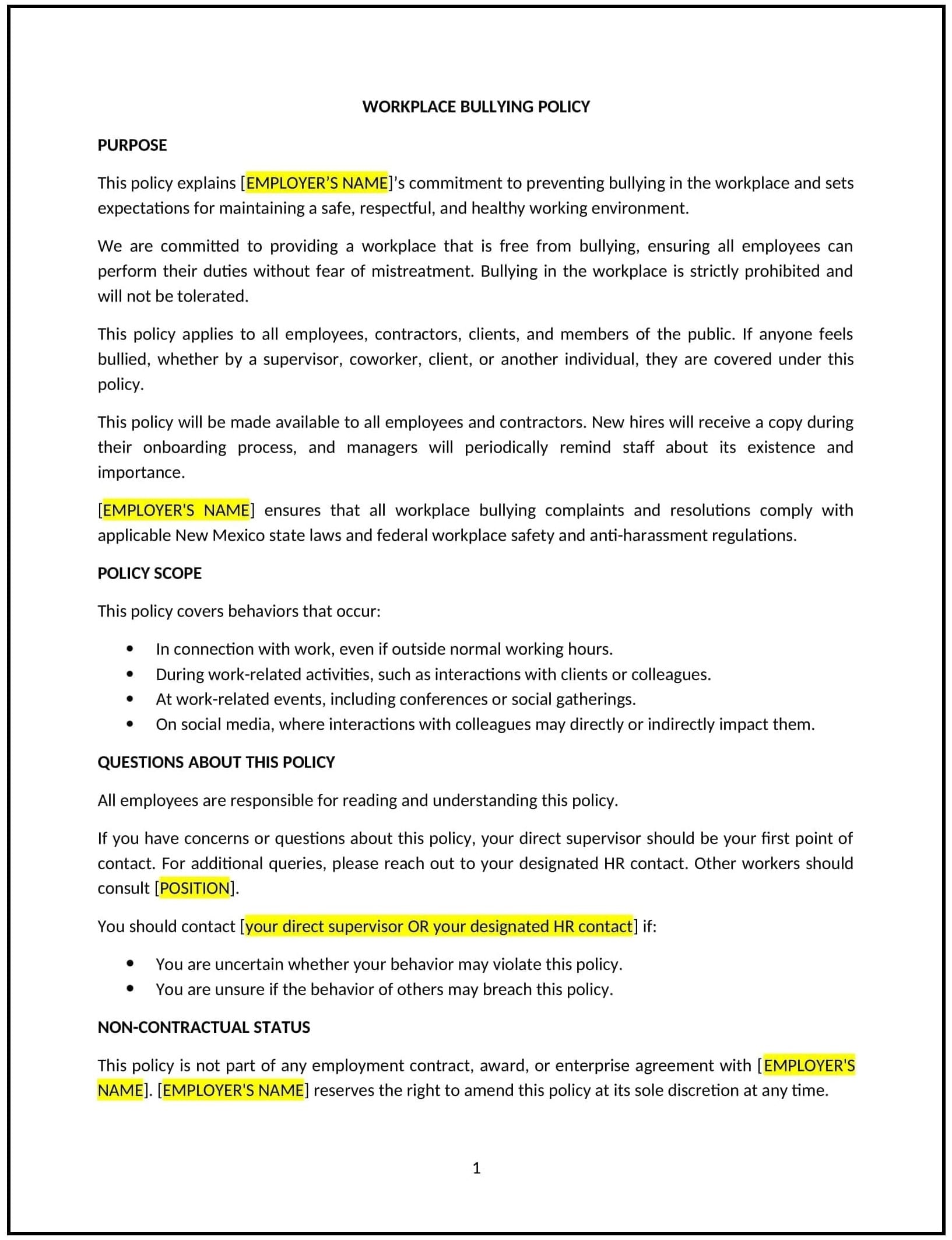Workplace bullying policy (New Mexico): Free template
Got contracts to review? While you're here for policies, let Cobrief make contract review effortless—start your free review now.

Customize this template for free
Workplace bullying policy (New Mexico)
A workplace bullying policy helps New Mexico businesses foster a respectful and productive work environment by setting clear expectations and procedures for addressing bullying behavior. This policy defines workplace bullying, outlines the steps employees can take to report incidents, and specifies the actions the business will take in response. It is designed to prevent bullying from occurring and to address any bullying that does arise in a timely and effective manner.
By adopting this policy, businesses in New Mexico can create a supportive workplace, reduce negative impacts on employee well-being, and maintain a professional and respectful culture.
How to use this workplace bullying policy (New Mexico)
- Define workplace bullying: Clearly define what constitutes workplace bullying, including verbal abuse, threats, intimidation, exclusion, and any other behavior that creates a hostile or harmful work environment.
- Set reporting procedures: Outline the process for reporting bullying incidents, including who employees should report to, how reports can be made (e.g., in writing, anonymously), and any timelines involved.
- Provide support for victims: Specify the support available to employees who are victims of bullying, including counseling services, employee assistance programs (EAPs), or other resources.
- Outline investigation and corrective actions: Detail how bullying incidents will be investigated, including the steps taken to gather information, interview witnesses, and make decisions about corrective actions. Ensure that investigations are impartial and conducted in a timely manner.
- Define consequences for bullying behavior: Establish the potential consequences for employees found to be engaging in bullying, which may include disciplinary action, counseling, or termination depending on the severity of the behavior.
- Communicate the policy: Ensure employees are aware of the policy during onboarding, through employee handbooks, and with regular reminders to reinforce the importance of maintaining a respectful workplace.
- Review and update: Periodically review and update the policy to ensure it remains relevant to the business and complies with any changes in New Mexico labor laws or workplace best practices.
Benefits of using this workplace bullying policy (New Mexico)
This policy provides several benefits for New Mexico businesses:
- Promotes a respectful work environment: A clear bullying policy helps set expectations for behavior, fostering a workplace culture of respect, inclusivity, and professionalism.
- Improves employee well-being: By addressing bullying behavior and offering support for victims, businesses help maintain a healthy and supportive environment that promotes mental and emotional well-being.
- Reduces turnover and absenteeism: A workplace free from bullying can improve employee retention by creating a positive atmosphere, reducing stress, and increasing job satisfaction.
- Minimizes legal risks: A well-defined policy and consistent enforcement can help businesses avoid legal complications related to harassment, discrimination, or workplace violence.
- Enhances productivity: When bullying is addressed effectively, employees can focus on their work without fear or distraction, improving overall productivity.
Tips for using this workplace bullying policy (New Mexico)
- Communicate the policy clearly: Ensure all employees understand the policy, how to report bullying, and the consequences of engaging in bullying behavior.
- Train employees and managers: Regularly provide training on identifying, preventing, and addressing bullying, as well as the importance of creating a respectful workplace.
- Provide accessible reporting mechanisms: Allow employees to report bullying incidents in various ways, ensuring confidentiality and protection from retaliation.
- Maintain consistent enforcement: Apply the policy consistently across the organization, ensuring that bullying is addressed promptly and appropriately, regardless of the individuals involved.
- Stay up-to-date on legal developments: Regularly review New Mexico’s labor laws to ensure the policy is in compliance with state-specific regulations regarding workplace behavior and bullying.